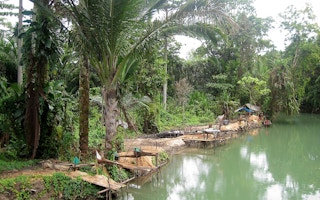Since the haze last year, many measures have been initiated among public and private sectors, as well as non-governmental organisations (NGOs). However, most measures—such as consumer boycotts—are about the “No” to problems, but the “Yes” to solutions is still rather limited, especially when it comes to peatland protection.
To continue reading, subscribe to Eco‑Business.
There's something for everyone. We offer a range of subscription plans.
- Access our stories and receive our Insights Weekly newsletter with the free EB Member plan.
- Unlock unlimited access to our content and archive with EB Circle.
- Publish your content with EB Premium.
Tropical peatland stores much more carbon than above-ground forest. Peat swamps are created when biomass accumulates in waterlogged conditions over thousands of years, with slow decomposition due to a lack of oxygen.
However, once the water is drained away for plantations like acacia (paper) or oil palm, the peat is exposed to air, causing the biomass to decompose quickly and release a massive amount of carbon dioxide (CO2). The drained peatland is also flammable and may smolder for months, causing transboundary haze once it starts burning.
To briefly quantify the environmental impact of peatland drainage in Indonesia, the fire-hotspot intensity (number of detected hotspot per area) on peatland is eight times higher than non-peatland. Even if there is no fire, acacia plantations on peatland release more carbon dioxide per dollar revenue compared to coal-fired power plants, the dirtiest form of power generation.
The formation of Indonesia’s Peatland Restoration Agency in January is a milestone, aiming to rewet and restore 2.6 million hectares of burnt or/and degraded peatland within five years. Some 87 per cent of this degraded peatland is within concession or cultivation areas. This may potentially lead to conflict of interest with companies who grow acacia and oil palm on peatland, since these two species by nature are not suitable for wet peatland.
Initiatives supporting peat-free paper and palm oil are important to gradually shift these two industries away from peatland, but the key is still to provide economic solutions for wet peatland.
Dutch wetland expert Wim Giesen has identified more than 80 species that can be grown on wet peatlands, bringing economic benefits to the communities. Wetland agriculture is also called “paludiculture”, and examples of crops which flourish on wet peatland include candlenut, illipe nut, sago palm, gelam (Melaleuca), jelutong, horse mango, rambutan, and swamp taro.
Some of these may even provide higher financial returns than acacia and oil palm. Diversifying the cultivation of paludiculture species will also improve community livelihoods and Indonesia’s food security. However, more demonstration projects with the best management practices are required for minimising the risk and maximising the benefits.
There is also no sufficient attention to value-adding downstream processes such as food manufacturing from raw paludiculture products. This is essential for making meaningful advances in the wet-peatland economy. The market recognition of peatland-friendly products is another big gap. Most people, including environmentally concerned consumers are unaware of the importance of peatland and the economic solutions to keep them wet.
Last November, fourteen food & beverage (F&B) giants, such as Unilever, Ben & Jerry’s, and Nestlé, jointly signed a letter to global leaders, advocating for clear, achievable, measurable and enforceable science-based targets for carbon emissions reductions.
“
Most people, including environmentally concerned consumers are unaware of the importance of peatland and the economic solutions to keep them wet.
To turn this into solid action, these F&B companies should work on improving downstream processes and creating markets for paludiculture products.
Besides improving the market driven economic solutions for wet peatland, there needs to be a stronger policy against peatland drainage. This is especially important given the urgent need to mitigate climate change. Nevertheless, the incentives for wet-peatland and the disincentives against peat drainage have to come hand in hand, in order to minimise political tension.
The Indonesia Palm Oil Pledge (IPOP) was an impactful business movement driving palm oil expansion away from peatland. However, its recent dissolution is an unfortunate consequence of political tension due to the over-emphasis on the “NOs” (including no deforestation, no peat, and no exploitation).
Putting a price on carbon and air-pollution emission will be an important policy to discourage peatland drainage. However, until the wet peatland economy becomes profitable, policy disincentives would only be possible if the international community provides an alternative incentive to wetland businesses.
For example, to offset the cost of implementing an emission tax for acacia and palm oil plantations on dry peatland, the income generated from this fee should be returned to the local government, and used to fund incentives for the community to abide by the no-drainage rules. Second, other countries who are affected by the haze and carbon emission can financially support the wetland economy.
Paying the polluters for stopping pollution to the environment can never be a solution. Investing in alternate win-win solutions to replace the existing polluting industry is the only answer. The strong incentive mechanism to solution providers will be the foundation for building strong disincentive mechanism against the polluters.
Stronger collaboration among governments, business, and NGOs is needed to increase the incentives for improving the sustainable peatland economy in order to drive away industries who need to operate on dry peatland.
Chris Cheng is a climate envoy for the Oscar M Lopez Centre. This article was written exclusively for Eco-Business.











